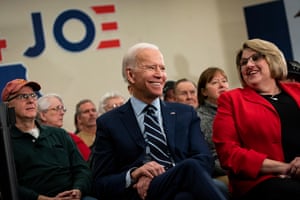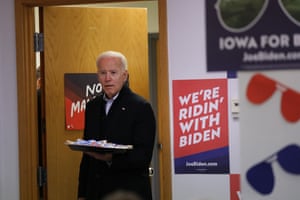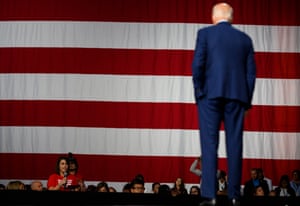Could Joe Biden lose Iowa but win the Democratic nomination?
Since 2000, every Democratic winner of Iowa has gone on to be the nominee – and Biden could lose the state given the notorious indecisiveness of voters

Photograph: Al Drago/Getty Images
Arriving more than an hour later than scheduled, Joe Biden wandered into his Iowa campaign office and offered “Joe 2020” cookies to a couple of dozen volunteers who had been busy making calls to voters to drum up support for the Democratic presidential candidate.
Surrounded by signs reading “We’re Ridin’ with Biden” and “Biden Time 20:20”, the former vice-president spent 15 minutes in the drab Des Moines office and made exactly one call – to an Iowa voter named Rosie – before thanking the phone bankers, who appeared to be outnumbered by journalists snapping pictures.
“Half of winning is showing up, so thank you for showing up for me,” Biden told them.
And on that note, and without taking any questions from reporters, the current frontrunner in the race to be the Democrat to take on Donald Trump in November’s general election took off.
If half of winning is indeed showing up, then one could argue that Biden should already be losing in Iowa, where the first caucuses of the Democratic presidential primary race – the process by which the nominee is chosen – kicks off on 3 February.
Caucus-goers in the crucial state expect to meet the candidate they are being asked to support, and late last year, Biden was criticized by senior Iowa Democrats for not putting in enough face time there. Biden’s Iowa organizers, who are critical to building supporter networks, were also dismissed as sluggish “duds”.
Those missteps in Iowa have been compounded by his gaffes on the national stage. Biden’s campaign launch in April was hobbled by multiple allegations of inappropriate touching, and he has since made a habit of attracting controversy with his comments on the campaign trail, particularly regarding race and gender.

Perhaps most memorably, Biden recalled his past work with senators who viscerally opposed the civil rights movement to reminisce about the former “civility” of the Senate, sparking immediate outrage from his rival candidates and many Democratic voters.
And yet, with less than two weeks to go, Biden arguably remains in the most enviable position of any Democratic presidential candidate.
He is caught in a close four-way race in Iowa with the Vermont senator Bernie Sanders, the Massachusetts senator Elizabeth Warren and the former South Bend mayor Pete Buttigieg, though a state poll released this week showed him slightly pulling ahead of the pack. Unlike Warren and Sanders, he has not been prevented from campaigning in Iowa this week due to the Senate impeachment trial against the president. He also just had his strongest fundraising quarter to date, and he has more congressional endorsements than his three closest competitors combined.
If Biden were to win Iowa, or even manage a strong showing, he could be difficult to catch, considering the importance of building momentum in Iowa and the three other early voting states – New Hampshire, Nevada and South Carolina. Since 2000, every Democratic winner of the Iowa caucuses has gone on to win the party’s nomination.
Biden, who is on his third attempt to win the nomination after failed runs in 1988 and 2008, is also considered a heavy favorite to win the early voting state of South Carolina, largely thanks to his popularity with African American voters, who make up a key component of the Democratic base.
That advantage, along with his name recognition, has enabled him to consistently lead national polls since entering the race and could propel him to multiple victories on Super Tuesday in early March, when voters in 14 states will head to the polls.

“We feel really good,” Biden said as he spoke to the phone bankers, dressed in an overcoat to protect himself against the Iowa cold. “I think we represent the broadest coalition of people, not just any one segment of the party.”
While a disproportionate amount of national news coverage has focused on the political preferences of white, college-educated Democrats, who tend to lean left, Biden has cobbled together a coalition of older voters, African Americans and more conservative members of the party, that his opponents have had difficulty matching.
“One could argue the real reason he’s still in first is because nobody else managed to put together yet a winning coalition,” one longtime Democratic pollster said. “It’s not a bad thing for Biden. That’s the way presidential nominations get decided sometimes. Sometimes, the rest of the field just isn’t good enough.”
However, the same pollster noted that Biden could easily lose his steady footing in the race if he finishes third or fourth an Iowa, a very real possibility given the notorious indecisiveness of the state’s voters. In the latest Des Moines Register/CNN/Mediacom poll, more than half of likely caucus-goers said they had not yet landed on a preferred candidate or could still be persuaded to support someone else.
One Iowa attendee of a Biden campaign event this month praised his experience and ability to repair America’s global reputation, but said he had not yet decided who to support. “I’m probably not going to make my firm commitment until the day that I walk into my caucus site,” said Jim Kelehan, 64.
Howard Dean, the former Vermont governor who sought the Democratic presidential nomination in 2004, has learned from experience to take any discussion of a primary “frontrunner” with a grain of salt. Speaking to the Guardian, Dean emphasized that he was also considered the favorite to win the Iowa caucuses before ultimately losing to John Kerry by 20 points.
“None of the national polls mean anything because it’s all about name recognition,” Dean said. “For any of the candidates, not just Joe.”
Dean’s 2004 campaign has sparked comparisons to Warren’s current White House bid. Both New England Democrats, Dean and Warren each appealed to the more liberal wing of the party but saw their polling numbers slide as they took attacks from the right and the left. In 2004, Democrats ultimately nominated Kerry, a longtime senator who seemed more likely to defeat George W Bush – an incumbent Republican president reviled by the party’s base.
Dean said this year’s nominating contest would ultimately come down to a similar question of whether voters will focus on the fear of defeat or the hope for change.
“I think it’s the same debate that we had in 2004,” Dean said. “Do you want the guy who’s going to really excite people but maybe polarize them, or do you want the safe choice?”

Progressive groups who oppose Biden have picked up on this “electability” issue and have taken pains to depict the longtime senator as a political insider who would allow Trump to sail to re-election.
“He will get outflanked on our issues by Donald Trump if he’s the nominee,” said Adam Green, the co-founder of the Progressive Change Campaign Committee, which has endorsed Warren. Green pointed to Biden’s past support for the Iraq war and for freezing retirees’ social security benefits, which Sanders has highlighted in recent days, as two issues where the frontrunner is vulnerable. “Trump would be able to play the outsider card as the most corrupt incumbent president ever,” Green said.
Sanders has recently escalated his attacks against Biden, and has simultaneously seen his support rise. A CNN poll released this week showed Sanders and Biden essentially tied nationally for first place, marking the first time that Biden has not held a solo lead in the outlet’s national polling. Sanders also raised an eye-popping $34.5m last quarter, the most of any Democratic candidate, and the unexpected strength of his ultimately unsuccessful 2016 campaign against Hillary Clinton made clear that he should not be underestimated.
But Biden’s allies are expressing confidence going into the final weeks before the caucuses. “He has certainly had the scrutiny and a lot of negative press coverage, and yet he is exactly where I like to see us right now,” said Harold Schaitberger, the general president of the International Association of Firefighters, a prominent union that endorsed him almost immediately after he launched his campaign.
Working to cement Biden’s position, Schaitberger has visited the union’s local chapters across Iowa to encourage members – even Republicans – to support him. “I think his campaign is trending and closing just as you want it to,” Schaitberger said.
But Dean offered a lesson that he learned 16 years ago: nothing matters until Iowa votes. Given the difficulty in winning over the state’s fickle voters, Dean said Iowa serves as a useful indication for who has the discipline to serve as president.
“We’ll see who has the capacity to do that,” Dean said. “But whoever does have the capacity to do it has the capacity to win the whole thing.”
• A graphic in this article was amended on 28 January 2020. An earlier version of the graphic showing polling averages had the figures for candidates Warren and Sanders the wrong way round. This has been corrected.
Source: US Politics - theguardian.com




